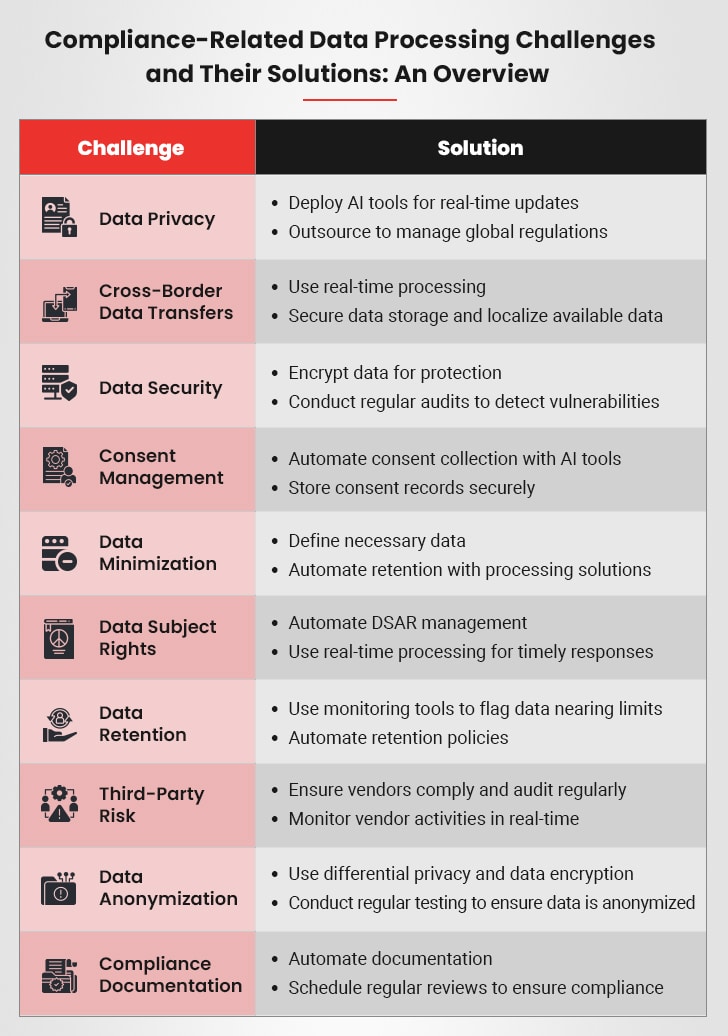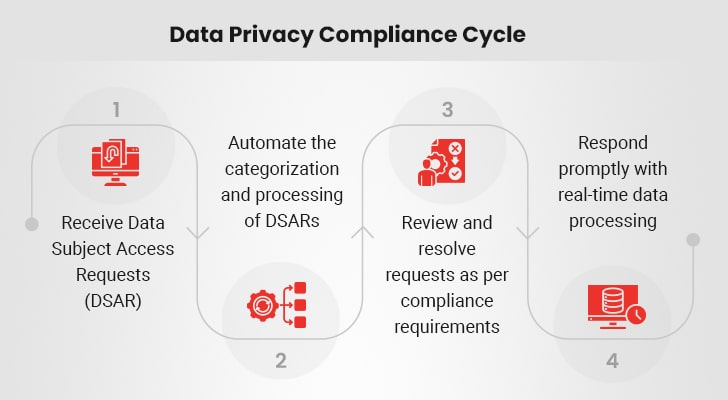Picture yourself navigating a tightrope, juggling data and intricate compliance regulations. A single mistake could result in an expensive tumble. Data processing is crucial in the fast-paced digital world of today, but ensuring compliance is challenging. Managing volumes of data and changing regulations make this balancing act seem overwhelming.

However, have no fear, we are here to support you. We will guide you through the top 10 data processing challenges and show you how to handle each one effectively. If you are dealing with problems related to data privacy, international transfers, or data security, we will simplify it for you to maintain control.
Table of Contents
- Data Privacy: The Ever-Moving Target
- Cross-Border Data Transfers: Navigating the Maze
- Data Security: The Ever-Present Threat
- Consent Management: Navigating Customer Permissions
- Data Minimization: Less Is More
- Data Subject Rights: Handling Requests with Precision
- Data Retention: Knowing When to Let Go
- Third-Party Risk: Keeping Tabs on Your Vendors
- Data Anonymization: Protecting Personal Information
- Compliance Documentation: Keeping Track of Everything
- Stay on the Right Side of Compliance
Compliance-Related Data Processing Challenges and Their Solutions: An Overview

1. Data Privacy: The Ever-Moving Target
Challenge:
Laws regarding data privacy such as GDPR and CCPA are always changing, creating significant data processing challenges for business. Handling data across multiple jurisdictions, each with unique regulations, lead to non-compliance risks. As such, organizations face legal penalties, reputational damage, and operational inefficiencies if they fail to promptly adapt to ever-changing regulations.
How can you ensure compliance in multiple jurisdictions?
Solution:
Automated data processing is the answer. Automation forms the foundation of effective data processing solutions for data privacy compliance. AI-driven tools can monitor evolving regulations and automatically update your privacy policies immediately, ensuring you stay ahead. These systems ensure real-time monitoring and compliance, thereby reducing the risk of errors. Incorporating data processing outsourcing services can also help you manage complex regulations. You can leverage external expertise to navigate global data privacy laws.
2. Cross-Border Data Transfers: Navigating the Maze
Challenge:
Transferring data between countries is fraught with unique challenging, particularly when laws such as GDPR are enforced. Disseminating data across borders without appropriate agreements can result in significant fines. The EU-US Privacy Shield being invalidated is a perfect instance that caused many businesses to seek other options.
Solution:
Relying on real-time data processing and secure data storage solutions eases cross-border compliance. Working with legal professionals also helps in maintaining compliance. Keep data localized whenever feasible to minimize risks and simplify operations. Moreover, leveraging data processing outsourcing to manage international transfers reduces the likelihood of risk and streamlines the compliance process.
3. Data Security: The Ever-Present Threat
Challenge: The risk of data breaches is increasing, and everyone is vulnerable. Cyberattacks have the potential to occur at any moment, with significant risks to both finances and reputation. As per Cybersecurity Ventures, it is expected that the global cost of cybercrime is expected to surge from $9.22 trillion in 2024 to $13.82 trillion by 2028. This makes data security one of the most prominent data processing challenges.
Solution:
Begin by encrypting all important information to safeguard your business. Whether it is inactive or moving, encryption acts as your primary form of protection. Regular security checks and integration of real-time data processing are vital for detecting and resolving vulnerabilities before they escalate into serious problems.
4. Consent Management: Navigating Customer Permissions
Challenge:
Managing consent is now a mandatory legal requirement, not just an optional feature. Violating regulations and losing customer trust are possible consequences if you do not obtain explicit consent. Hiding consent requests in your terms and conditions is no longer acceptable. If you are collecting customer email addresses for marketing purposes, you must have explicit and easily understood permission.
Solution:
AI-powered consent management tools assist in simplifying this procedure by automating the collection and storage of consent, consistently ensuring adherence to regulations.
5. Data Minimization: Less is More
Challenge:
Speaking of collecting data, having more is not always advantageous. Laws such as GDPR stress the significance of data minimization, which involves gathering only the necessary information. Collecting more data increases your level of responsibility and heightens your risk. Healthcare institutions, for example, frequently face difficulties with this issue.
Solution:
It is essential to clearly outline the data needed for your operations and set up specific policies for data retention and deletion for meeting compliance. Use data processing solutions to enforce these rules and delete unnecessary data automatically. Partnering with data processing providers also helps streamline compliance while enabling you to focus on core operations.
6. Data Subject Rights: Handling Requests with Precision
Data Privacy Compliance Cycle

Challenge:
As per modern-day data privacy regulations, people are entitled to view, amend, or erase their personal information. Dealing with Data Subject Access Requests (DSARs) becomes daunting, particularly when faced with numerous requests during a data breach, reaching the hundreds or even thousands. This adds to the list of significant data processing challenges businesses must address. Without proper systems in place, managing these requests strain resources and delay response times. Ultimately, failure to comply could result in regulatory penalties or damaged customer trust.
Solution:
Automate DSAR management using advanced data processing solutions. These systems handle requests efficiently, ensuring timely responses and compliance with legal deadlines. Incorporating real-time data processing allows businesses to address DSARs promptly, minimizing disruptions during critical periods.
Transform Your Business with Advance Data Processing Services.
7. Data Retention: Knowing When to Let Go
Challenge:
Keeping data beyond what is needed is not just a storage problem but also poses a risk for compliance. Businesses must delete personal data when it is no longer necessary according to regulations. However, several organizations find it challenging to determine the exact definition of “no longer needed.” Unnecessary data also increases security risks and operational costs, making it harder to manage.
Solution:
Set up automated data retention policies that will delete or store data according to established rules. Regular audits help identify and remove redundant information. Train your team to understand retention timelines and compliance requirements. Use monitoring tools to flag data nearing retention limits. This ensures compliance while also liberating important storage capacity.
8. Third-Party Risk: Keeping Tabs on Your Vendors
Challenge:
When you transfer data processing tasks to external providers, your risk exposure continues beyond sending the information. You could still face responsibility if the data is mishandled by your vendor. Without proper oversight, gaps in compliance could go unnoticed, leading to financial and reputational damage. Thoroughly vetting your vendors is of utmost importance, including reviewing their security protocols and compliance history. Regularly updating contracts to reflect evolving regulations is also essential.
Solution:
Make sure they adhere to the same data processing standards as you do and conduct regular audits to check their compliance. Collaborate with vendors to establish clear data-handling protocols and regular reporting systems. Use third-party risk management tools to monitor vendor activities in real time. This is particularly crucial for sectors that heavily depend on data processing outsourcing.
9. Data Anonymization: Protecting Personal Information
Challenge:
Anonymizing data by eliminating personal identifiers seems straightforward. However, it is a complicated procedure. If improperly handled, anonymized data may be able to be linked back to individuals, potentially leading to your company breaching compliance regulations.
Numerous financial institutions anonymize customer data for the purpose of internal analysis. Yet, if the information can be linked to a specific person, then it defeats the purpose.
Solution:
Utilize advanced methods such as differential privacy to guarantee the data remains anonymous and protected. Additionally, implement encryption alongside anonymization to add an extra layer of security. Furthermore, regularly test the anonymized data to ensure it cannot be re-identified. Establish strict internal protocols for handling anonymized datasets to minimize risks. Finally, leverage specialized software that automates anonymization while adhering to compliance standards.
10. Compliance Documentation: Keeping Track of Everything
Challenge:
Compliance involves following regulations and proving that you are following them. An organization may face penalties even if it complies with regulations but lacks the required paperwork.
Additionally, the complexity of regulatory requirements often makes manual record-keeping inefficient and error-prone. As a result, ensuring consistency in documentation is a persistent challenge.
Solution:
Integrate compliance documentation into your daily tasks. Utilizing workflow automation tools can guarantee that records remain up to date with all required information accessible for audits. Moreover, schedule regular internal reviews to ensure documentation aligns with current regulations. Finally, train staff on the importance of detailed record-keeping to minimize oversights and enhance readiness for audits.
Stay on the Right Side of Compliance
Understanding data processing regulations can be challenging, but by implementing effective tactics, it is possible to maintain equilibrium. Every problem, whether it’s managing consent or securing third-party relationships, can be solved.
If handling all these tasks seems overwhelming, you should use data processing services to make the journey easier. These services assist in following regulations and make data management more efficient, providing a sense of assurance. But, when you outsource data processing services, it’s important to work with a trustworthy partner who can ensure your data processing needs are handled in an efficient and compliant manner.





